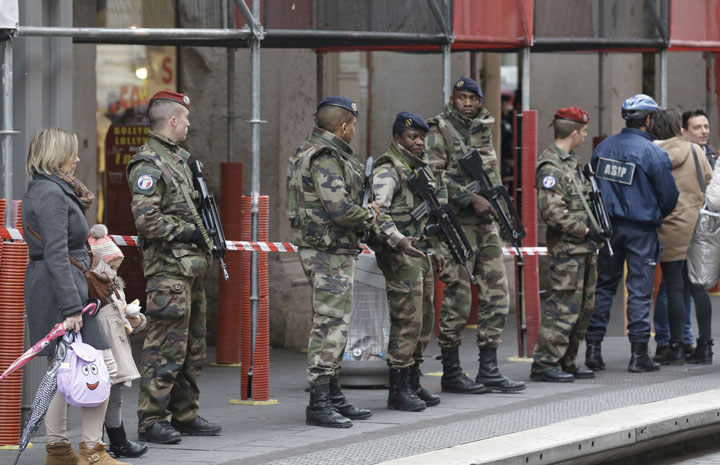PARIS — A former criminal who had been blocked by French and Turkish police from travelling along a route used by jihadi fighters on Tuesday allegedly attacked three French soldiers with a knife outside a Jewish community center in southern France, officials said.

READ MORE: French police raid town with strong jihadi network
France’s counterterrorism agency last week flagged the suspect, Moussa Coulibaly, to Turkish authorities before he flew on Jan. 28 on a one-way ticket to Turkey, a transit point for jihadis from Europe to join Islamic extremist groups fighting in Syria and Iraq, one French security official said.
Coulibaly and a suspected accomplice were detained after the attack on the soldiers, who were conducting an anti-terrorism patrol in front of a Jewish community center in Nice as part of stepped-up security measures since a three-day spree of deadly terror attacks in and around Paris last month.
The incident pointed to improved coordination between French and Turkish authorities in combatting the movement of would-be jihadis, while also raising the specter that those who don’t make it to Iraq and Syria might try to wreak violence at home.
After his return home, French authorities were unable to turn up enough evidence against Coulibaly to open a legal case against him. Agnes Thibault-Lecuivre, a spokeswoman for the Paris prosecutor’s office, which handles terrorism cases, said Coulibaly had previously been convicted six times on charges including theft, violence, illegal drug use and insulting police — but not terrorism.
The security official said Coulibaly had committed those crimes in the northeastern city of Mulhouse between 2006 and 2009.
The attacker was armed with “two huge knives that actually resembled more a machete,” said Philippe Pradel, a security official at Nice city hall, on BFM TV.
“He freely attacked a soldier, but the knife was ineffective because the soldier was wearing a flak jacket. So then he tried to attack his face.”
In a text message to The Associated Press, Thibault-Lecuivre said there was no family relation between Coulibaly and Amedy Coulibaly, who killed four hostages in a kosher supermarket in Paris and gunned down a policewoman as part of the terrorism rampage last month.
The surname Coulibaly is relatively common for families of Malian descent.
In a joint statement, the defense and interior ministers said one soldier was injured in the face and another, who rushed to the aid of his colleague, was injured in the forearm in the attack in Nice. Police reinforcements then stepped in to arrest the attacker, it said.
Authorities were investigating a possible motive.
France has been on high alert since the attacks in Paris by three Islamic extremists that left 20 people dead, including the gunmen. More than 10,000 soldiers have been deployed around the country to protect sensitive locations, including major shopping areas, synagogues, mosques and transit hubs.
- 14-year-olds accused in Halifax homicide appear in court, bail hearing set
- B.C. to ban drug use in all public places in major overhaul of decriminalization
- 2 teens charged with murder in case of 16-year-old killed outside Halifax mall
- Cars torched, explosions heard in suspected arson in Montreal neighbourhood
READ MORE: 5 Chechens arrested in southern France, 1 with explosives
Earlier Tuesday, French authorities arrested seven men and a woman suspected of being involved in sending fighters to join Islamic extremists in Syria. Interior Minister Bernard Cazeneuve said those arrested in the Paris and Lyon areas were not suspected of links to the Jan. 7-9 terror attacks.
Three of those arrested in the sweeps Tuesday had travelled to Syria and returned in December, according to the security official, though it was unclear whether they had joined the Islamic State group or another militant group.
The network began sending French fighters to Syria in May 2013, and at least one of them was killed there, the official said. The group did not appear to be involved in any particular plot, or linked to any other networks already broken up in France in recent months, the official said.
France has seen hundreds of homegrown radicals join extremists abroad, most linked to the Islamic State group in Syria and Iraq.
Associated Press writers Greg Keller contributed.



Comments